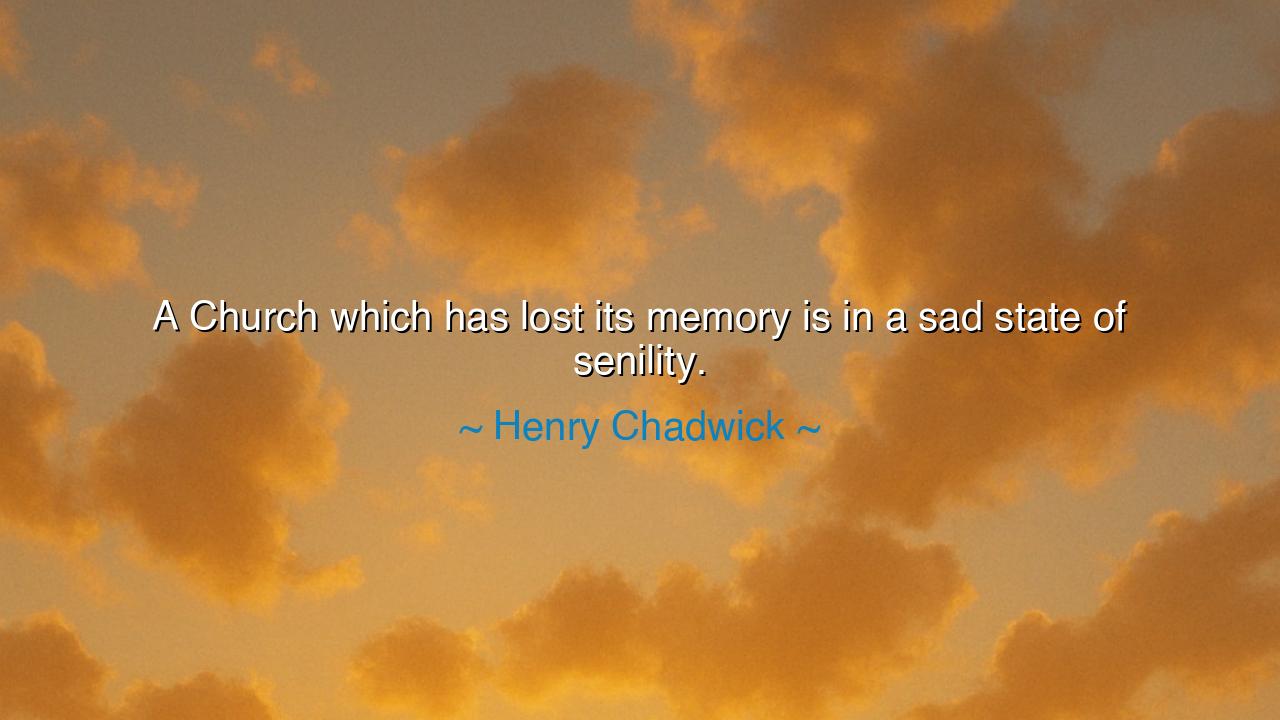
A Church which has lost its memory is in a sad state of senility.






When Henry Chadwick wrote, “A Church which has lost its memory is in a sad state of senility,” he spoke not only of the Church as an institution, but of all human communities — of nations, of civilizations, and of the soul itself. For what is memory but the anchor of identity? Without it, even the holiest body drifts into confusion, mistaking novelty for wisdom and forgetting the sacred roots from which it was born. Chadwick, a historian and theologian of great depth, saw that the Church’s memory — its remembrance of the faith, the saints, the struggles, the ancient truths — was the pulse of its life. When that memory fades, what remains is not renewal, but spiritual decay dressed in the illusion of progress.
In the ancient world, memory was revered as divine. The Greeks called her Mnemosyne, the mother of all the Muses — for they knew that every act of creation, every art, every truth, springs from remembrance. To forget, therefore, was to die a little, to sever the connection between what was and what is. So too, Chadwick warns, the Church that forgets its story — its martyrs, its creeds, its centuries of prayer and repentance — becomes old not in years, but in spirit. Senility, as he calls it, is not merely physical decline; it is the loss of continuity, the withering of wisdom that once gave life meaning.
The early Christians understood this. They gathered in secret catacombs not only to worship but to remember — to tell again the stories of Christ and the apostles, to speak aloud the names of those who had suffered for truth. Their faith was an unbroken chain, each link forged by remembrance. But in times of comfort, when faith becomes fashionable, that chain weakens. The fire of tradition is left untended, and the memory of struggle fades into mere ritual. Chadwick saw this as the great danger of modern faith: that in seeking to be modern, the Church might forget to be eternal.
History itself offers a warning. When the Roman Empire abandoned its moral and civic traditions, it did not fall to armies alone — it fell to amnesia. The people forgot the virtues that once bound them together: discipline, duty, reverence. The temples stood, the titles remained, but the spirit was gone. And so it is with any Church or people who lose their memory. They may keep their names, their hymns, their buildings — but without remembrance, they are hollow echoes of their former selves. The body remains, but the soul has departed.
To keep memory alive, one must not cling to the past as a museum, but as a living inheritance. The ancients kept fire not by preserving its ashes, but by passing on its flame. So too must faith — and all human institutions of spirit — nourish the living memory that gives meaning to the present. Chadwick’s words are a call to vigilance: that tradition is not bondage, but breath. To remember rightly is to remain alive. The one who forgets where he came from cannot know where he is going.
Consider the Jewish people, who through centuries of exile and persecution never lost their identity. Why? Because they remembered — in prayer, in ritual, in word, in song. Every Sabbath, every Passover, they retold the story of deliverance, not as history, but as living truth. In remembrance, they endured. And so, Chadwick’s warning extends beyond the Church — to all humankind: forget your origins, and you lose your strength; abandon your story, and you forfeit your soul.
The lesson is clear and timeless. Whether you are part of a Church, a nation, or a family, you must guard the sacred thread of memory. Know your beginnings. Honor your ancestors. Study the wisdom that has endured the ages, for it was carved by those who lived and died for truth. The world that despises memory grows rootless, easily swayed by fashion and falsehood. But the soul that remembers stands firm, like an oak whose roots reach deep into the soil of time.
So, O seeker, let Chadwick’s words live in you: Do not forget. Remember who you are, and whose you are. Remember what was fought for, what was built, what was believed. For the past is not a prison — it is the foundation upon which all true renewal must rest. And the moment a people, a Church, or a soul forgets its memory, it begins to grow old, not with wisdom, but with senility — and that is the saddest aging of all.






AAdministratorAdministrator
Welcome, honored guests. Please leave a comment, we will respond soon